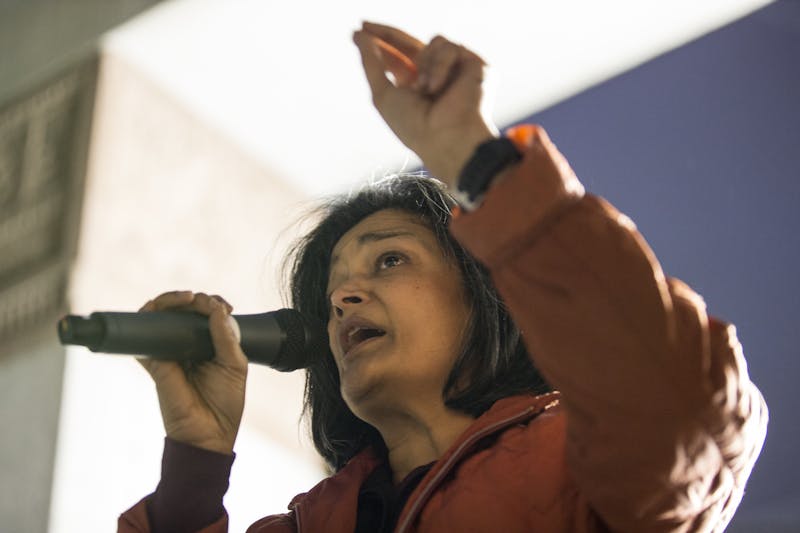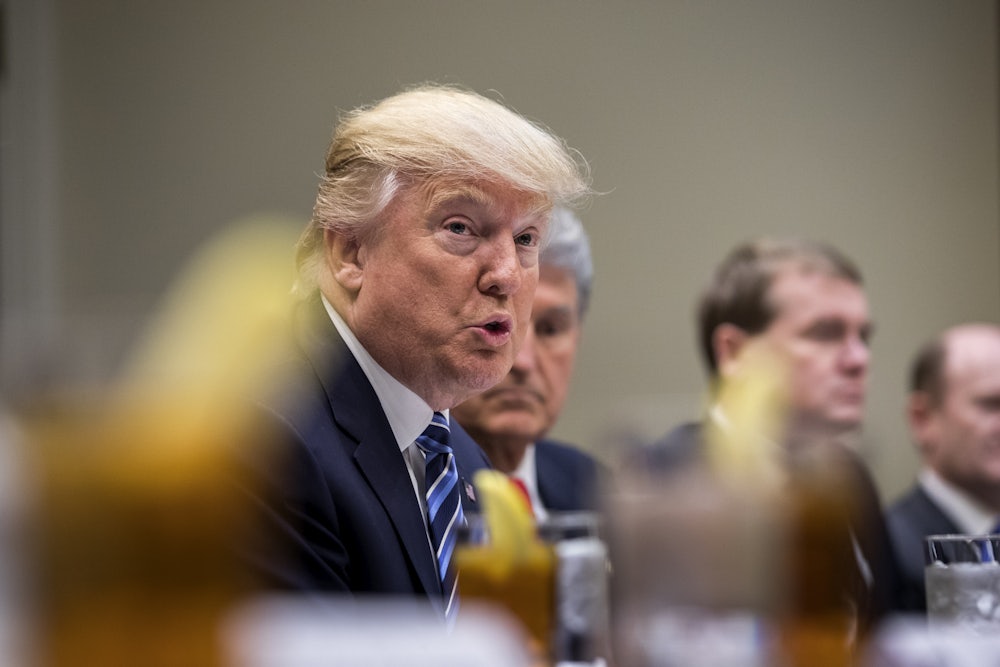President Donald Trump is planning to exploit a terrorist attack. He made that explicit recently when he lashed out at federal judge James Robart for blocking his ban on immigration from seven majority-Muslim countries:
Just cannot believe a judge would put our country in such peril. If something happens blame him and court system. People pouring in. Bad!
— Donald J. Trump (@realDonaldTrump) February 5, 2017
This tweet was the clearest signal yet that Trump intends not only to absolve himself of responsibility for any future terrorist attacks, but also to fault his opponents for any such carnage. In addition to the judiciary, he’s preemptively blaming the media. “It’s gotten to a point where it is not even being reported and in many cases, the very, very dishonest press does not want to report it,” he said this week, inaccurately. “They have their reasons, and you understand that.”
Trump will implicate his political opponents, too. Democrats need to prepare for this. “Since Trump is preemptively trying to insulate himself from blame for terrorist attacks,” the New Republic’s Jeet Heer wrote on Monday, “it’s up to the Democrats and the broader anti-Trump coalition to push a counter-narrative immediately.” The obvious counter-narrative is that Trump—according to a wide variety of national security expects—is not making America safer, but rather more vulnerable to terrorism.
At least one elected Democrat is already pushing this message. At last Saturday’s Congressional Progressive Caucus retreat in Baltimore, Representative Pramila Jayapal of Washington state raised the issue in a room full of liberal lawmakers planning their political strategy.
“There’s another thing that’s going to throw us off message, and that’s if we have any kind of an attack or a war,” she said. “I just want us to be thinking about that because there are lots of things that are happening right now that you could argue are setting us up for an attack. I believe that’s true of the executive orders, and we know what happened after 9/11, and we have to be thinking about what is our jiu-jitsu move to actually prepare the stage so that if something does happen it’s clear who created that and who created the environment for that to happen.”
After the attacks on the the World Trade Center and the Pentagon in 2001, congressional Democrats almost uniformly rallied around President George W. Bush, authorizing the Republican’s use of military force in Afghanistan. Representative Barbara Lee, whom Jayapal calls “a great hero of mine,” was the lone “no” vote in Congress. It was a period of intense nationalism and jingoism, and it’s easy to imagine Trump trying to exploit a similar sentiment in the service of his authoritarian agenda—or simply to improve his dismal poll numbers.
“I mean, I’m not a conspiracy theorist,” Jayapal told her colleagues, “but I really do believe that war is a great way to get your poll numbers up. We just need to be thinking about what happens when that comes forward and how we prepare the stage right now with our message so that the blame goes exactly where the blame should be and we don’t all have to rally around in patriotism.”

Few of Jayapal’s colleagues are talking as candidly about the politics of terrorism, but they are beginning to use the messaging she described. In a statement to The New Republic, Senate Minority Leader Chuck Schumer said of Trump’s attacks on judges:
President Trump is aiming at the wrong target and trying to preemptively absolve himself of responsibility for any future catastrophes. The fact remains, the President’s executive order is un-American and would make America less safe. This executive order is a rallying call for our enemies that seek to do us harm and potentially exposes our service members and civilians in the field to more danger. He ought to be focused on lone wolf attacks and people slipping through the vetting process instead, which this ill-considered and ill-conceived executive order potentially makes more likely.
It might be unseemly to plan political spin ahead of a terrorist attack, but Democrats also can’t be caught flat-footed if the moment arrives. Trump, after all, is already messaging about it now. Perhaps Democrats should be, too.
Symone Sanders, a Democratic strategist for the Priorities USA Action Super PAC, says her party would have to walk a fine line in the event of an attack: working to bring the nation together while placing culpability squarely where it belongs.
“This will be on the hands of Donald Trump and his administration,” she said, adding that the immigration order “is playing right into the hands of ISIS.” Sanders says elected Democrats should be holding town halls with constituents and warning about the dangers that Trump is courting. Political groups like hers, meanwhile, could send the message that his foreign policy blunders are a threat to national security. “They also need to begin to string together the narrative,” she said. “It’s not just the Muslim ban. It’s building the wall with Mexico. It’s the conversations with foreign leaders.”
Such messaging could be in the cards for Priorities, but any conservation about the specifics of it would be premature, Sanders said, stressing in a follow-up email, “NO ONE SANE IS RIGHT NOW PLANNING ADS ABOUT TERRORIST ATTACKS.”
That might seem excessive, but stakes of this narrative battle would be extraordinarily high. As the New Republic’s Brian Beutler wrote on Tuesday, a national security crisis and subsequent surge in support for Trump could embolden him in frightening ways:
If the attack Trump is courting comes, the ensuing battle for narrative control will determine whether he, or his opposition, is held responsible for it, and thus, how durable the resistance to authoritarianism will be. His opponents will have facts on their side, but he will have the largest bully pulpit and the means of retribution at his disposal. If at some point, without changing tactics, Trump wins over a broader swath of the public, the real damage to democracy will begin.
In addition to citing Trump’s reckless rhetoric and sloppy executive orders, there are other ways Democrats can move the terrorism conversation to their advantage. Statistically, it’s unlikely that the first major attack on Trump’s watch will be committed by an Islamic radical from abroad. Rather, it will be someone who is in the U.S. legally, most likely a citizen. Since 9/11, more Americans were killed on U.S. soil by right-wing terrorists than radical Islamists.
So Democrats were right to pounce on reports that the Trump administration intends to change the federal government’s “Countering Violent Extremism” program to focus exclusively on Islamic extremism rather than white supremacists and other such groups. In a letter to Secretary of State Rex Tillerson, Homeland Security Secretary John Kelly, and Defense Secretary James Mattis, a dozen senators wrote, “Singling out a specific religion as the focus of CVE efforts rather than violent extremism more broadly—while ignoring threats from white supremacist groups—would severely damage our credibility with foreign allies and partners as an honest broker in the fight against violent extremism, and prove divisive in communities across our country.” That’s a good start, but the letter should have added: “It would also make the country more vulnerable to terrorism from within.”
Or, to use Trump’s parlance: “Just cannot believe a president would put our country in such peril. If something happens blame him. Bad!”
